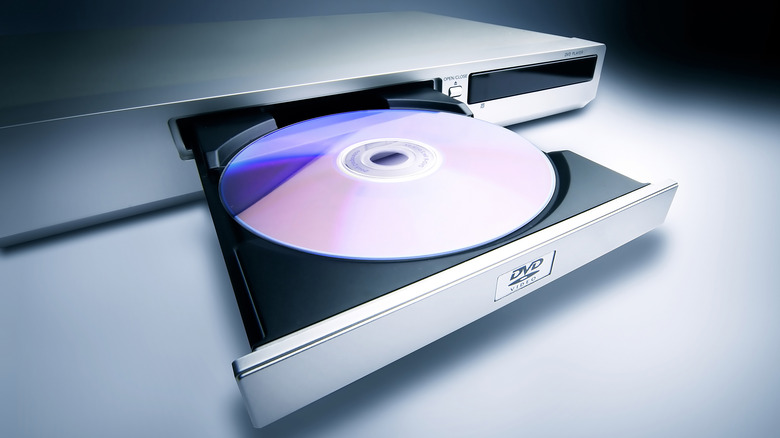The Real Reason HD-DVD Lost The Format Wars
The HD-DVD format lasted a paltry two years, from its release in 2006 to its discontinuation in 2008. As HD televisions began to hit commercial markets, consumers were looking for a good way to play high-definition media. Eventually, an electronics engineer named Shuji Nakamura invented blue laser diodes that could better store HD media on discs (via PC World). This made HD playback all the more realistic and cost-effective to achieve for a general consumer market.
Sony, using this technology, went on to create the Blu-ray disc, which is well known today as a format for playing high-definition media. During this same time, another format was being created, headed by Toshiba, that ultimately came to be known as HD-DVD. The two formats directly competed against each other; HD-DVD made its debut in 2006, just a few months before Blu-ray had its release. The ensuing format war wasn't something either company wanted, and they tried to negotiate terms in order to allow both formats to stay afloat. However, these compromises did not pan out.
The Blu-ray and HD-DVD negotiations
Both HD disc formats had different standards for their models, such as the way interactivity on the discs was handled. The makers of Blu-ray and HD-DVD attempted to come to a compromise on these standards so that it would be easier for movie studios to produce their titles for either one, as explained by EE Times Asia. The DVD forum, which was behind HD-DVD, and the Blu-ray Disc Association attempted to negotiate throughout 2005. However, according to Forbes, these talks eventually came to a standstill, and no progress was made.
In 2006, both formats were released without any compromises, triggering a format war. In the beginning, HD-DVD had a head start with an earlier release. Early Blu-ray players were also proving to not work as well as their counterparts at this time. Eventually, though, the Blu-ray format began to gain traction due to a number of factors, namely better marketing and more commercial support.
How HD-DVD lost (and Blu-ray won)
The biggest defining factor in the HD-DVD's demise was the eventual loss of support for the format. At the beginning of 2008, Warner Bros. announced that going forward, it would only release HD titles in the Blu-ray format. This came after the tides had turned and Blu-ray was now outperforming HD-DVD, and a lot of this was partly due to the release of the Playstation 3, which could play Blu-rays, as reported by BBC.
After the Warner Bros. announcement, other companies followed suit and pulled support for HD-DVDs, including Walmart, Best Buy, Netflix, and Blockbuster. This quickly incited the format's downfall, and at the very end even the two major supporters of HD-DVD — Universal and Paramount — conceded to producing movies only on Blu-ray. That was the final straw for HD-DVD, and, in 2008, Toshiba announced that it would no longer produce the format.
Since Toshiba was essentially forced to pull out after only two years, it was a better move for the company in the long run, avoiding a lengthy and complicated format war. It was also better for consumers as there was only one HD format to worry about; the market for the next-generation video was smaller and this made it far less complex for people to get high-definition media and players.


